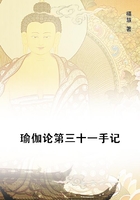1 This fundamental ground is our preference of doing to thinking. Now this preference is a main element in our nature, and as we study it we find ourselves opening up a number of large questions on every side.
2 Let me go back for a moment to Bishop Wilson, who says:--'First, never go against the best light you have; secondly, take care that your light be not darkness.' We show, as a nation, laudable energy and persistence in walking according to the best light we have, but are not quite careful enough, perhaps, to see that our light be not darkness.
This is only another version of the old story that energy is our strong point and favourable characteristic, rather than intelligence. But we may give to this idea a more general form still, in which it will have a yet larger range of application. We may regard this energy driving at practice, this paramount sense of the obligation of duty, self-control, and work, this earnestness in going manfully with the best light we have, as one force. And we may regard the intelligence driving at those ideas which are, after all, the basis of right practice, the ardent sense for all the new and changing combinations of them which man's development brings with it, the indomitable impulse to know and adjust them perfectly, as another force. And these two forces we may regard as in some sense rivals,--rivals not by the necessity of their own nature, but as exhibited in man and his history,--and rivals dividing the empire of the world between them. And to give these forces names from the two races of men who have supplied the most signal and splendid manifestations of them, we may call them respectively the forces of Hebraism and Hellenism. Hebraism and Hellenism,--between these two points of influence moves our world. At one time it feels more powerfully the attraction of one of them, at another time of the other;and it ought to be, though it never is, evenly and happily balanced between them.
3 The final aim of both Hellenism and Hebraism, as of all great spiritual disciplines, is no doubt the same: man's perfection or salvation. The very language which they both of them use in schooling us to reach this aim is often identical. Even when their language indicates by variation,--sometimes a broad variation, often a but slight and subtle variation,--the different courses of thought which are uppermost in each discipline, even then the unity of the final end and aim is still apparent.
To employ the actual words of that discipline with which we ourselves are all of us most familiar, and the words of which, therefore, come most home to us, that final end and aim is 'that we might be partakers of the divine nature.' These are the words of a Hebrew apostle, but of Hellenism and Hebraism alike this is, I say, the aim. When the two are confronted, as they very often are confronted, it is nearly always with what I may call a rhetorical purpose; the speaker's whole design is to exalt and enthrone one of the two, and he uses the other only as a foil and to enable him the better to give effect to his purpose. Obviously, with us, it is usually Hellenism which is thus reduced to minister to the triumph of Hebraism.
There is a sermon on Greece and the Greek spirit by a man never to be mentioned without interest and respect, Frederick Robertson, in which this rhetorical use of Greece and the Greek spirit, and the inadequate exhibition of them necessarily consequent upon this, is almost ludicrous, and would be censurable if it were not to be explained by the exigencies of a sermon. On the other hand, Heinrich Heine, and other writers of his sort, give us the spectacle of the tables completely turned, and of Hebraism brought in just as a foil and contrast to Hellenism, and to make the superiority of Hellenism more manifest. In both these cases there is injustice and misrepresentation.
The aim and end of both Hebraism and Hellenism is, as I have said, one and the same, and this aim and end is august and admirable.
4 Still, they pursue this aim by very different courses.
The uppermost idea with Hellenism is to see things as they really are;the uppermost idea with Hebraism is conduct and obedience. Nothing can do away with this ineffaceable difference. The Greek quarrel with the body and its desires is, that they hinder right thinking, the Hebrew quarrel with them is, that they hinder right acting.' He that keepeth the law, happy is he;' 'Blessed is the man that feareth the Eternal, that delighteth greatly in his commandments;'--that is the Hebrew notion of felicity; and, pursued with passion and tenacity, this notion would not let the Hebrew rest till, as is well known, he had at last got out of the law a network of prescriptions to enwrap his whole life, to govern every moment of it, every impulse, every action. The Greek notion of felicity, on the other hand, is perfectly conveyed in these words of a great French moralist:















